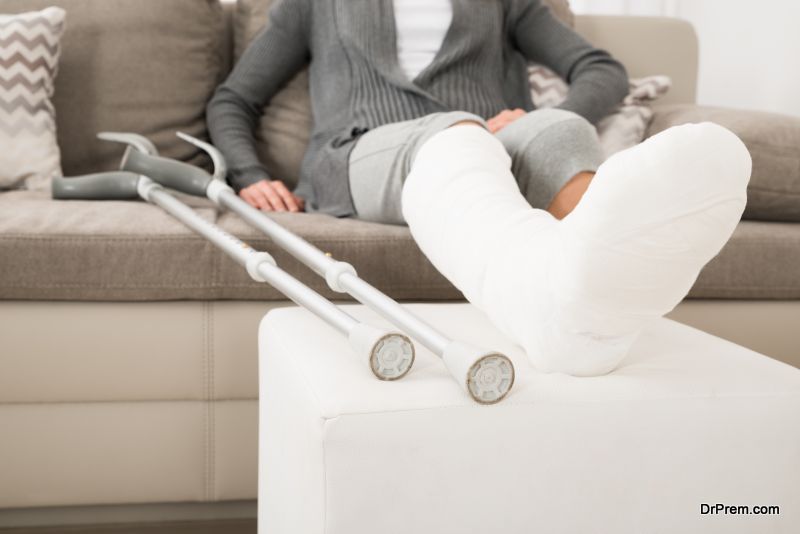Unfortunately, injuries can interrupt the flow of daily life and shift your sense of security in your body and routine. When an injury is traumatic, either mentally or physically, it can throw you for a loop. Regardless of the scale of the trauma, your experiences are valid, and you deserve care. While things may be unfamiliar for a while, it’s vital to give yourself the necessary time and space to heal in all the essential ways.
Everyone experiences trauma differently, but we all need a few things to heal and grow after a traumatic event or injury. With the help of your loved ones and some trained professionals, you’ll be well on your way to rehabilitation in all its forms soon enough — all you have to do is give yourself a little extra grace and care.
1. Take Some Time to Rest and Adjust
 While your new situation may not be permanent, it could impact the way you live for a little while. Even if your injury is short-term, you never know what needs it’ll create going forward. Your life isn’t going to be typical right now, and that’s OK. It may not be what you expected, but the sooner you accept your situation, the sooner you can adjust to your needs within it.
While your new situation may not be permanent, it could impact the way you live for a little while. Even if your injury is short-term, you never know what needs it’ll create going forward. Your life isn’t going to be typical right now, and that’s OK. It may not be what you expected, but the sooner you accept your situation, the sooner you can adjust to your needs within it.
Breaks are vital, especially if you’re physically drained and uncomfortable. By taking a step back, you can recognize which tasks are reasonable to do right now and which ones you’ll need to ask for help with. Adjusting to your new situation will assist in your healing process and get you on the road to recovery fully energized and ready to take on so much more.
2. Rely on Your Support System
Your friends, family and loved ones are always here for you — so embrace it! Especially when healing from trauma, you can’t do it all alone. You may need your staunchest supporters now more than ever, as recovery from any trauma is a time to rest and re-center yourself. It can be hard to be alone during this time, and having loved ones around you can help relieve that burden. Asking someone to stay with you so you’re not by yourself can be valuable.
Those closest to you may offer help, and you should take them up on that. Talk to them, let them aid you with tasks you’re having trouble with or enjoy the companionship. Right now is the best time to ask for what you need.
3. Prioritize Your Mental Health
 Whether your injury is physical or your trauma is more mental and emotional, it will almost certainly make itself known in your mental health. While not everyone experiences post-traumatic stress disorder, symptoms and characteristics such as depression, fear or even flashbacks to the event can be present after trauma. Remind yourself you’re not alone, and that your experiences are normal.
Whether your injury is physical or your trauma is more mental and emotional, it will almost certainly make itself known in your mental health. While not everyone experiences post-traumatic stress disorder, symptoms and characteristics such as depression, fear or even flashbacks to the event can be present after trauma. Remind yourself you’re not alone, and that your experiences are normal.
Practicing self-care is crucial, from basic personal hygiene to the treats that make life a little better. Meet all your needs, but don’t forget to brighten your day with your favorite movies or a special snack every once in a while, to uplift you during dark times. If you’re struggling, seeking professional help like therapy or support groups could be an excellent option. Do regular mental health checks on yourself.
4. Be Patient
Depending on your particular trauma, your healing may take time. It’s possible to address and heal some injuries almost immediately, while others leave lasting impacts on both the mind and body. It can be natural to want to get back to normal as soon as possible, but give yourself time to heal properly.
Changes are part of life, even when they’re difficult or unexpected. You may need to relearn things or find new ways of functioning, and that’s OK. Be patient with yourself — you deserve it.
5. Listen to Your Body
 When you’re navigating your comfort levels after any significant change, listen to yourself and your needs. It can be tempting to push yourself past your comfort level, but that can cause more harm than good when it comes to your healing. One of the best ways to heal an injury quickly and effectively is to decrease the stress on the tissue in question.
When you’re navigating your comfort levels after any significant change, listen to yourself and your needs. It can be tempting to push yourself past your comfort level, but that can cause more harm than good when it comes to your healing. One of the best ways to heal an injury quickly and effectively is to decrease the stress on the tissue in question.
While you should continue healthy activities, such as healing exercises and physical therapy, according to your doctor’s orders, going out of your way to push yourself won’t do much for you. It can cause strain and further damage. Let yourself rest and don’t overdo it.
Prioritize Your Healing
Going through trauma isn’t easy, no matter what that trauma looks like. Show yourself care and kindness during your healing process, so you can recover. There may be some adjustment, but you are strong and capable of handling it. Often, self-compassion is one of the bravest and boldest things you can do.
Article Submitted By Community Writer




